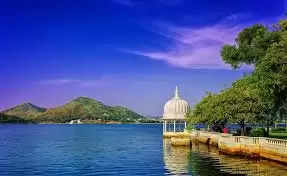Udaipur to Overcome Water Crisis with Dewas Water Supply Projects
District Collector Arvind Poswal Identifies Causes of Water Crisis
Udaipur, renowned as the "City of Lakes," grapples with a persistent water scarcity issue, especially in its outskirts, despite its picturesque setting amidst the Aravalli Range. While drinking water remains accessible to urban residents, many rural areas rely on water tankers, particularly during the scorching months from April to June.
The inauguration of the Dewas 3rd and Dewas 4th water supply projects marks a significant stride towards alleviating this long-standing challenge. Valued at Rs. 1690 crores, these projects, initiated by Chief Minister Bhajan Lal Sharma, aim to address the water needs of Udaipur until 2050.
In an interview with Udaipur’s District Collector Arvind Kumar Poswal, shed light on the underlying causes of the water crisis and the anticipated impact of the Dewas project.
The decline in water levels in Udaipur's man-made lakes, attributed to unchecked hill cutting over the past decade, emerges as a critical factor exacerbating the crisis. This ecological disruption not only affects water supply but also disrupts the natural habitats, such as the vital Menar Lake, essential for migratory birds.
The water level has gone down a lot, which is worrying because Udaipur depends on tourism, which needs the lakes. In the hottest months, they have to use tanker trucks to bring water to places near big cities like Bargaon and Bhinder. Things get a bit better when it starts raining in June, but the problem isn't completely fixed.
Mr. Poswal emphasized the role of unauthorized construction, obstructing lake inlets, which has led to the complete drying up of several lakes in recent years. However, he expressed optimism in the Dewas project's potential to triple water supply, benefiting the city with an additional 1000 MCFT annually.
“There has been unregulated construction that has obstructed the in-lets of various lakes. 10 years ago, a few lakes completely dried up. Even vehicles used to be driven across them. Phase 1 and Phase 2 of the Dewas project eased that issue. With the 3rd and 4th phase, the water supply will increase threefold. The city will get 1000 MCFT of water in addition to the current annual supply.” said the collector.
The administration's concerted efforts to regulate hill cutting and enforce penalties on violators, in line with High Court directives, signify a proactive approach towards environmental conservation. Furthermore, proposed state-level initiatives aim to bolster hill protection measures, ensuring the sustainability of water resources.
Under the phased implementation of the Dewas project, the construction of dams and tunnels, such as Gorana Dam, Madri Dam, and the upcoming Gogunda dam that will be built near Ambawa village, alongside interconnecting tunnels, promises to bolster Udaipur's water infrastructure significantly.
With administrative and financial approvals secured, and construction tenders awarded, the commencement of land acquisition heralds a tangible step forward in addressing Udaipur's water crisis. Mr. Poswal concluded with optimism, envisioning a future where the impending water projects offer respite from the pressing challenges posed by climate change and deforestation, particularly crucial for sustaining Udaipur's tourism-driven economy.
“Water is a necessity for each individual. Climate change and deforestation have led to the lowering of the water level. In Udaipur, the crisis is huge due to the tourism factor. We are hopeful that with the upcoming project, the problem will be solved for many years.” - Mr. Poswal
Source: Click Here
To join us on Facebook Click Here and Subscribe to UdaipurTimes Broadcast channels on GoogleNews | Telegram | Signal



